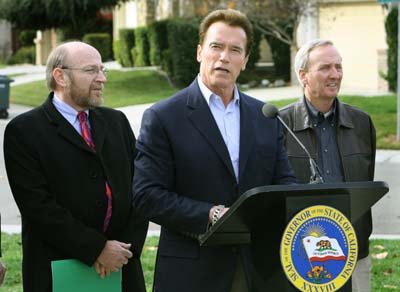
More than two months of a tense standoff over ever-shrinking
resources gave way late Monday to an agreement among California’s
four legislative leaders and Republican Gov. Arnold Schwarzenegger
to bridge a $26.3 billion gap between expenditures and the state’s
plummeting revenues.
– Courtesy of McClatchy
More than two months of a tense standoff over ever-shrinking resources gave way late Monday to an agreement among California’s four legislative leaders and Republican Gov. Arnold Schwarzenegger to bridge a $26.3 billion gap between expenditures and the state’s plummeting revenues.
The exhilaration on display as the Big 5 emerged from the governor’s Capitol office was in the closing of the deal, if not the details. An agreement, which will go to both houses of the Legislature later this week, will allow the state to discontinue issuing high-interest IOUs to vendors, and stanch the decline of the state’s credit, which had two recent downgrades to near junk-bond status.
The agreement included Democratic concessions of more than $14 billion in program cuts _ hitting the poor, children, the elderly and disabled while avoiding outright elimination of the state’s welfare-to-work CalWORKS program, and the Healthy Families health insurance program for children.
Though they failed to get permanent reductions in welfare programs through changes in eligibility standards, Schwarzenegger and Republican legislators were able to uphold their vow of no new taxes with a series of accounting shifts and an enforced “loan” of nearly $4 billion from local governments.
By accelerating income tax withholdings by 10 percent, negotiators would shift millions of next year’s revenues into this year’s budget. A delay by one day in state workers’ paychecks _ from this year to next _ also saves millions.
From the beginning, Democrats had little hope that they could win approval of tax increases, though they proposed in their final budget conference committee $2 billion of taxes on oil companies, on alcohol and tobacco sales, and the closing of numerous corporate loopholes.
Republicans have near veto-proof power _ thanks to the constitutional requirement of a two-thirds vote for budgets and taxes _ to stand firm on their avowed anti-tax principle, despite representing barely more than one-third of either the Senate or the Assembly.
Despite a hard-hitting lobbying effort, cities and counties will take a major hit _ with the state poised to borrow nearly $4 billion in revenues from local property taxes and gas taxes, resulting in what critics say will be a devastating impact on local services.
Schools took a $9.3 billion cut in February’s budget deal, but won a commitment to be paid back and an assurance that in future years, the base of Proposition 98 won’t be ravaged by this year’s steep revenue decline.
Schwarzenegger’s call for a 5 percent pay decrease for state workers fizzled, though he is expected to keep three monthly furlough days through next June.
The budget deal also resets the parameters for future budgets, with the lower levels of state spending _ now about $78 billion, compared with more than $100 billion a year ago _ acting as a new starting point for future years, a major development for Republicans who have sought for years to control state spending.









